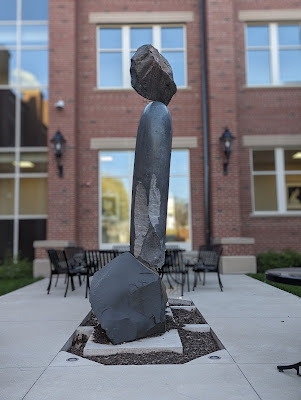 |
| Queen Anne's lace, an invasive plant from Europe. |
On the Wednesday after the election, I was fortunate to have already planned to attend a conference for the Iowa Association of Naturalists. The Naturalists are a great group to hang with—In Iowa they are used to being undervalued by politicians but keep trying to make the world a better place. A lot of kids love them for the opportunity to be out of the classroom, learning about a frog by getting muddy while learning to catch one.
Accommodations for the IAN conference were at a hotel on the Meskwaki Settlement. An option for the afternoon of arrival was visiting the Meskwaki Cultural Center and Museum. Coming from Dubuque, I was familiar with the story of the early Europeans encountering the Meskwaki at their encampment along the Mississippi River, now the location of Dubuque’s sewage treatment plant. Julian Dubuque married the chief’s daughter and got the mining rights. He is now buried atop a bluff just downstream in the Mines of Spain State Recreation Area.
The Europeans remain. The Meskwaki do not.
But some Meskwaki returned, purchased land, and created the Meskwaki Settlement. Now their casino advertises the loosest slots in Iowa. There’s something ironically just about them using gambling to get back some of the wealth taken from them.
But most importantly, they persisted. Compared to what Native Americans have endured, I have no room to get upset about the outcome of an election.
Around the same time, I was rereading a few Murakami books and looking forward to his The City and Its Uncertain Walls, now recently published. Murakami was rejected by Japan’s literary establishment but has seen his books translated into 50 languages. Now he is regularly considered for a Nobel Prize in Literature.
Despite an uphill battle, he kept writing. He says, “My books have been criticized so much over the years, I don’t pay much attention.”
And the criticism continues:
“Bad magical realism lacks both magic and realism, and The City and its Uncertain Walls should take its place alongside Coelho’s The Alchemist, Fowles’s The Magus, Gibran’s The Prophet and any number of other books that you can just about be forgiven for admiring as a teenager but which, to an adult reader, offer little more than embarrassment.”
Review in the Guardian, 10 Nov 2024.
Recently while driving through Wyoming, I and my wife listened to Jeremy Irons narrate The Alchemist—we nearly ran out of gas because time passed so quickly. I was embarrassed about the gas, not the book.
In reading the above review of Murakami, I’m reminded of some of the critiques of Democrats after Trump was elected—arrogant and out of touch. Did the reviewer of Murakami’s book need to not only trash the book but also anyone who likes it? Is it not possible to despise Trump while liking some of his followers? Or at least showing some compassion?
Bret Stephens said, “The Democratic Party at its best stands for fairness and freedom. But the politics of today’s left is heavy on social engineering according to group identity. It also, increasingly, stands for the forcible imposition of bizarre cultural norms on hundreds of millions of Americans who want to live and let live but don’t like being told how to speak or what to think. Too many liberals forgot this, which explains how a figure like Trump, with his boisterous and transgressive disdain for liberal pieties, could be re-elected to the presidency.”
I’m also reminded of experiences at academic conferences—often parades of ego and one-upmanship. But, yes, those academics were once my tribe, and I have certainly demonstrated my share of arrogance.
Somehow the naturalists have mostly escaped arrogance. Part of the reason, no doubt, is the time they spend with nature. They see the slow changes, the beauty and the damage, and they choose their times and opportunities to make a difference.
They believe in the magical realism of nature. But they have few illusions about the uphill battles they face—you can’t make a baby in a month by getting nine women pregnant.
So the Naturalists, the Meskwaki, and Murakami all teach me to be a bit more humble, to take my own burrs a bit less seriously. But also to persist.









